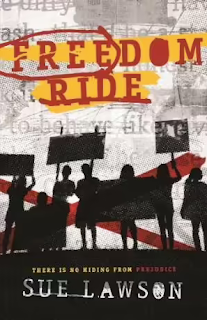Sue Lawson's Freedom Ride somehow slipped by me when it was first published -- oh, wait, it was 2015, I did have a lot going on that year... This was another book recommended by a school librarian, one she believed every student should read. I would add that every Australian adult should read it, too. Freedom Ride focuses on a shameful part of our recent history that some people would prefer remained forgotten or swept beneath the rug.
Despite the title, Freedom Ride is centred less on the 1960s freedom rides themselves than on one of the country towns they visited. The very first chapter is confronting for a modern reader, as an Aboriginal women is kept waiting in a grocery store until all the white customers are served -- and almost worse, when one white man insists on her being served before him, another customer is loudly affronted. The battle lines are clearly drawn along racial lines, and teenage Robbie has to examine his own attitudes when he befriends caravan park owner Barry, who has returned from London with a more enlightened philosophy.
There is another drama playing out in Robbie's family, when he discovers that his horrible father and grandmother have to been lying to him for most of his life, but the racial politics is revolting. There are 'colour bars' in place in the local shops, the theatre, the swimming pool -- it's pretty much apartheid. The indigenous population are relegated to neglected shanty towns on the fringes of (fictional) Walgaree, and then blamed for their own disadvantage. So when Barry hires Aboriginal boy Micky as well as Robbie to help out in the caravan park, all hell breaks loose.
Freedom Ride is involving and engaging, but in another way, it's hard to read. It's set in the year before I was born, before the referendum that gave Aboriginal people citizenship. It still shocks me that this happened within my own lifetime, and that we still have so very far to go.















No comments:
Post a Comment
0 comments